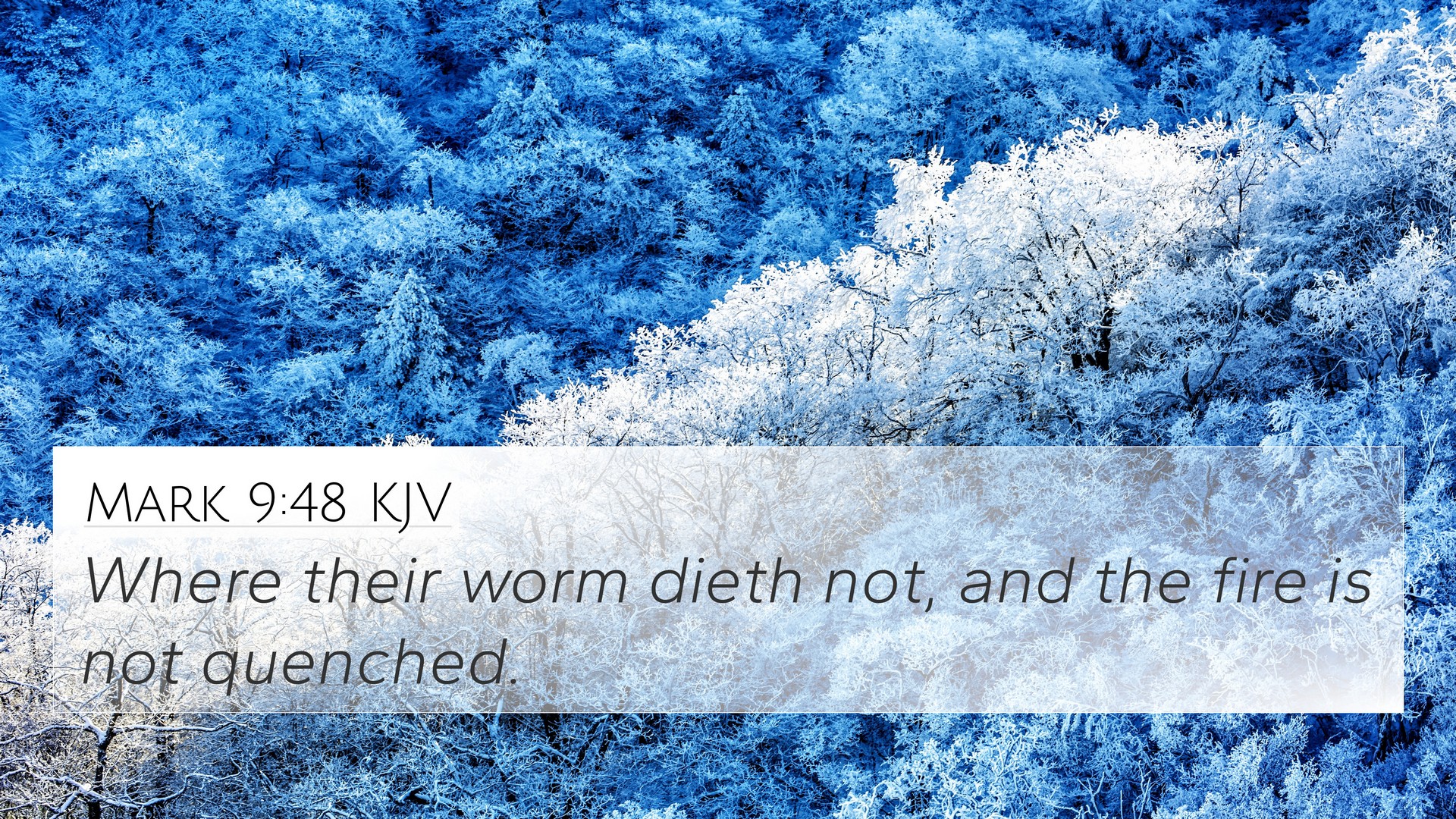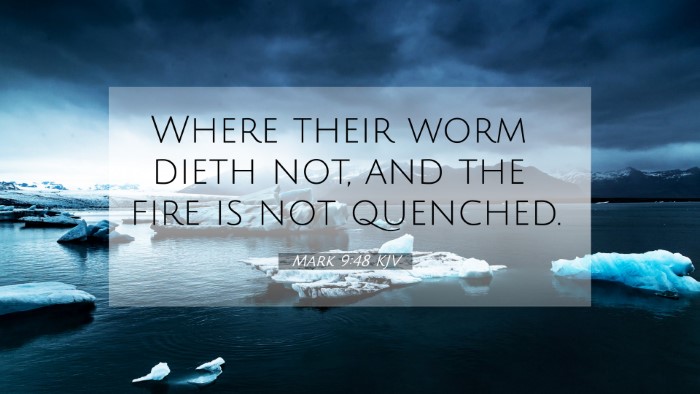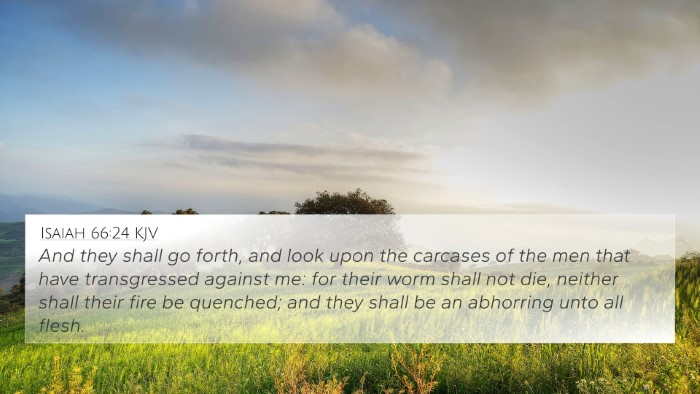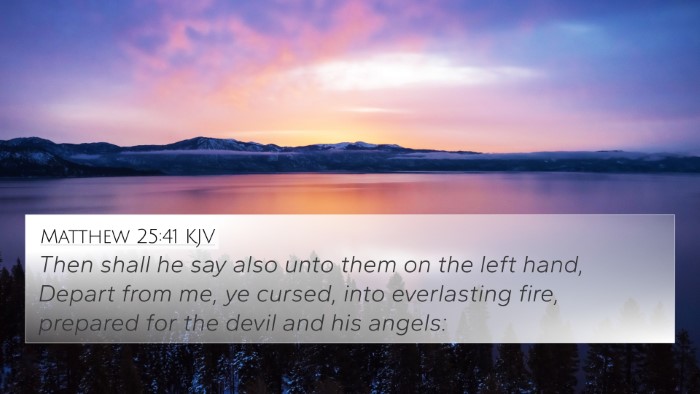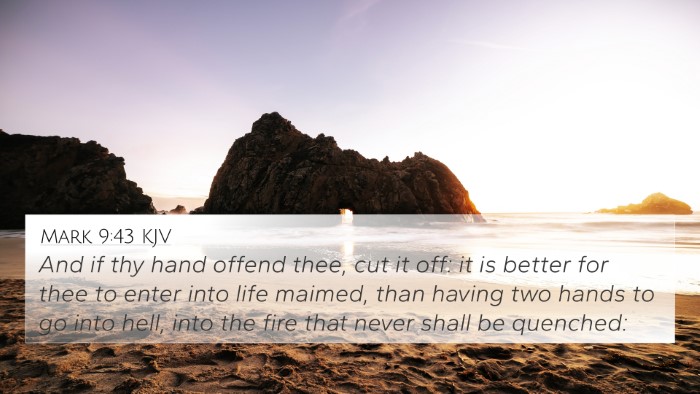Understanding Mark 9:48
Mark 9:48 states, "Where their worm does not die, and the fire is not quenched." This verse offers profound insight into the consequences of sin and the eternal state of the wicked. By examining this passage through the lens of various public domain commentaries, such as those by Matthew Henry, Albert Barnes, and Adam Clarke, we can unravel its meaning and significance.
Contextual Overview
This verse is situated in a passage where Jesus speaks about the seriousness of sin and the dire consequences that may follow. He emphasizes the need for radical measures to avoid sin, highlighting that the eternal punishment for sin is severe and unending. The imagery of "worm" and "fire" represents continual torment.
Commentary Insights
- Matthew Henry Commentary: Henry emphasizes that the mention of the "worm" signifies not just a physical torment but a psychological and spiritual anguish that accompanies eternal damnation. The fire that does not quench symbolizes an everlasting separation from God, representing the ultimate consequence of unrepented sins.
- Albert Barnes Commentary: Barnes discusses the imagery used by Jesus, noting that the phrase reflects the Jewish understanding of hell. He connects this teaching to the necessity of living a life that pleases God, urging believers to avoid anything that could lead to such a fate.
- Adam Clarke Commentary: Clarke elaborates on the "everlasting fire," interpreting it as a state of persistent suffering. He brings attention to the importance of acknowledging one’s sinfulness and the need for redemption through repentance.
Thematic Connections
Mark 9:48 can be linked to several thematic teachings within the Bible:
- Consequences of Sin: This passage mirrors teachings in Romans 6:23, where the wage of sin is death.
- Heaven and Hell: The contrast between eternal life and eternal punishment can be further explored in John 3:16 and 2 Thessalonians 1:9.
- The Fear of God: Proverbs 1:7 discusses the beginning of wisdom as the fear of the Lord, a theme that resonates with the themes of judgment presented in Mark 9:48.
Cross-References
To further understand the implications of Mark 9:48, we can examine the following Bible cross-references:
- Isaiah 66:24: "And they shall go forth and look upon the corpses of the men who have transgressed against Me; For their worm does not die, and their fire is not quenched." This verse echoes the imagery found in Mark 9:48, reinforcing the concept of eternal punishment.
- Matthew 5:29-30: Here, Jesus emphasizes taking drastic measures to avoid sin, similar to the stark warning found in Mark 9:48.
- Revelation 14:11: "And the smoke of their torment goes up forever and ever; and they have no rest day or night." This passage highlights the enduring nature of the suffering described in Mark 9:48.
- Luke 16:23-24: The parable of the rich man and Lazarus illustrates the reality of hell, aligning with the warnings of eternal suffering.
- Matthew 13:42: "...and cast them into the furnace of fire. There will be wailing and gnashing of teeth." This verse again presents the theme of eternal judgment.
- Hebrews 10:27: "But a certain fearful expectation of judgment, and fiery indignation which will devour the adversaries." This verse provides a stern warning about the consequences of rejecting God.
- Mark 9:43-47: The surrounding verses emphasize the seriousness of sin, urging believers to take their spiritual walk seriously.
Conclusion
Mark 9:48 serves as a grim reminder of the reality of judgment and the eternal consequences of sin. By examining this verse through the lens of public domain commentaries and cross-referencing with other scriptures, we grasp a deeper understanding of the theological implications of Jesus’ warnings. The consistent themes of eternal punishment weave through numerous biblical texts, reaffirming the necessity of recognizing sin and seeking redemption.
Utilizing Cross-References in Bible Study
For anyone engaged in cross-referencing Bible texts, understanding how themes and ideas connect can offer profound insights into scripture. Tools for Bible cross-referencing, such as a Bible concordance or a cross-reference guide, are essential in studying related scriptures. Learning to identify connections between the Old and New Testament and applying cross-referencing methods enriches one’s understanding of the biblical message.
